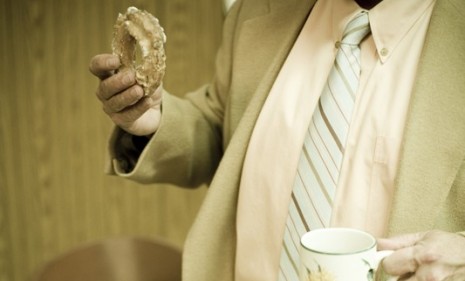Is your job making you fat?
Junk food isn't the only cause of America's obesity epidemic, say researchers. Being chained to your computer is also a major danger. Is there any solution?

While poor diets and lack of exercise are typically blamed for the expansion of the average American's waistline, new research published this week in the journal PLoS One has found another culprit: The workplace. Nearly two-thirds of Americans are overweight or obese, and that's due, in part, to our sedentary jobs. Here, a brief guide:
What did the study find?
Fifty years ago, workers burned 120 to 140 more calories each day. That's because Americans used to be more active — say, plowing fields instead of sitting at desks. At the same time, the amount of leisure-time physical activity hasn't changed much in recent decades. According to the study, expending 100 fewer calories per day would be in line with the weight gain seen in Americans since 1960.
The Week
Escape your echo chamber. Get the facts behind the news, plus analysis from multiple perspectives.

Sign up for The Week's Free Newsletters
From our morning news briefing to a weekly Good News Newsletter, get the best of The Week delivered directly to your inbox.
From our morning news briefing to a weekly Good News Newsletter, get the best of The Week delivered directly to your inbox.
How did they come up with these calorie counts?
Researchers looked at U.S. Bureau of Labors Statistics figures on the prevalence of different occupations over time, and cross-referenced those numbers with a broad national database on body weight.
Were most jobs really so active 50 years ago?
Yes. Five decades ago, nearly half of private-industry jobs were in physically demanding fields like construction, farming, mining, and manufacturing. Now, with the rise of jobs in business, education, and retail, less than 20 percent require physical activity.
A free daily email with the biggest news stories of the day – and the best features from TheWeek.com
So we should blame our jobs?
Not entirely. But the decrease in work-related physical labor is a component of the obesity epidemic. "There are a lot of people who say it's all about food," says Dr. Timothy S. Church, the study's lead author. "But the work environment has changed so much we have to rethink how we're going to attack this problem."
Haven't we heard this before?
Sort of. It's long been known that Americans get less exercise at work than they used to. But this study is thought to be the first to quantify the change in daily caloric expenditure.
What should I do?
Doctors say we need to be more conscious of the physical activity, we are, or in most cases aren't, getting at work. "We need to think about physical activity as a more robust concept than just recreational physical activity," says Dr. Ross Brownson, whose 2005 research was included in the new report. "In many ways we've engineered physical activity out of our lives, so we've got to find ways to put it back into our lives, like taking walks during breaks or having opportunities for activity that are more routine to our daily lives, not just going to the health club."
Sources: U.S. News & World Report, New York Times
-
 Why is the Pentagon taking over the military’s independent newspaper?
Why is the Pentagon taking over the military’s independent newspaper?Today’s Big Question Stars and Stripes is published by the Defense Department but is editorially independent
-
 How Mars influences Earth’s climate
How Mars influences Earth’s climateThe explainer A pull in the right direction
-
 ‘The science is clear’
‘The science is clear’Instant Opinion Opinion, comment and editorials of the day